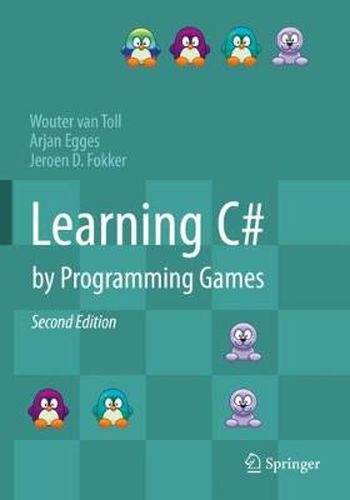Readings Newsletter
Become a Readings Member to make your shopping experience even easier.
Sign in or sign up for free!
You’re not far away from qualifying for FREE standard shipping within Australia
You’ve qualified for FREE standard shipping within Australia
The cart is loading…






This title is printed to order. This book may have been self-published. If so, we cannot guarantee the quality of the content. In the main most books will have gone through the editing process however some may not. We therefore suggest that you be aware of this before ordering this book. If in doubt check either the author or publisher’s details as we are unable to accept any returns unless they are faulty. Please contact us if you have any questions.
Developing computer games is a perfect way to learn how to program in modern programming languages. This book teaches how to program in C# through the creation of computer games - and without requiring any previous programming experience. Contrary to most programming books, van Toll, Egges, and Fokker do not organize the presentation according to programming language constructs, but instead use the structure and elements of computer games as a framework. For instance, there are chapters on dealing with player input, game objects, game worlds, game states, levels, animation, physics, and intelligence. The reader will be guided through the development of four games showing the various aspects of game development. Starting with a simple shooting game, the authors move on to puzzle games consisting of multiple levels, and conclude the book by developing a full-fledged platform game with animation, game physics, and intelligent enemies. They show a number of commonly used techniques in games, such as drawing layers of sprites, rotating, scaling and animating sprites, dealing with physics, handling interaction between game objects, and creating pleasing visual effects. At the same time, they provide a thorough introduction to C# and object-oriented programming, introducing step by step important programming concepts such as loops, methods, classes, collections, and exception handling. This second edition includes a few notable updates. First of all, the book and all example programs are now based on the library MonoGame 3.6, instead of the obsolete XNA Game Studio. Second, instead of explaining how the example programs work, the text now invites readers to write these programs themselves, with clearly marked reference points throughout the text. Third, the book now makes a clearer distinction between general (C#) programming concepts and concepts that are specific to game development. Fourth, the most important programming concepts are now summarized in convenient Quick Reference boxes, which replace the syntax diagrams of the first edition. Finally, the updated exercises are now grouped per chapter and can be found at the end of each chapter, allowing readers to test their knowledge more directly. The book is also designed to be used as a basis for a game-oriented programming course. Supplementary materials for organizing such a course are available on an accompanying web site, which also includes all example programs, game sprites, sounds, and the solutions to all exercises.
$9.00 standard shipping within Australia
FREE standard shipping within Australia for orders over $100.00
Express & International shipping calculated at checkout
This title is printed to order. This book may have been self-published. If so, we cannot guarantee the quality of the content. In the main most books will have gone through the editing process however some may not. We therefore suggest that you be aware of this before ordering this book. If in doubt check either the author or publisher’s details as we are unable to accept any returns unless they are faulty. Please contact us if you have any questions.
Developing computer games is a perfect way to learn how to program in modern programming languages. This book teaches how to program in C# through the creation of computer games - and without requiring any previous programming experience. Contrary to most programming books, van Toll, Egges, and Fokker do not organize the presentation according to programming language constructs, but instead use the structure and elements of computer games as a framework. For instance, there are chapters on dealing with player input, game objects, game worlds, game states, levels, animation, physics, and intelligence. The reader will be guided through the development of four games showing the various aspects of game development. Starting with a simple shooting game, the authors move on to puzzle games consisting of multiple levels, and conclude the book by developing a full-fledged platform game with animation, game physics, and intelligent enemies. They show a number of commonly used techniques in games, such as drawing layers of sprites, rotating, scaling and animating sprites, dealing with physics, handling interaction between game objects, and creating pleasing visual effects. At the same time, they provide a thorough introduction to C# and object-oriented programming, introducing step by step important programming concepts such as loops, methods, classes, collections, and exception handling. This second edition includes a few notable updates. First of all, the book and all example programs are now based on the library MonoGame 3.6, instead of the obsolete XNA Game Studio. Second, instead of explaining how the example programs work, the text now invites readers to write these programs themselves, with clearly marked reference points throughout the text. Third, the book now makes a clearer distinction between general (C#) programming concepts and concepts that are specific to game development. Fourth, the most important programming concepts are now summarized in convenient Quick Reference boxes, which replace the syntax diagrams of the first edition. Finally, the updated exercises are now grouped per chapter and can be found at the end of each chapter, allowing readers to test their knowledge more directly. The book is also designed to be used as a basis for a game-oriented programming course. Supplementary materials for organizing such a course are available on an accompanying web site, which also includes all example programs, game sprites, sounds, and the solutions to all exercises.